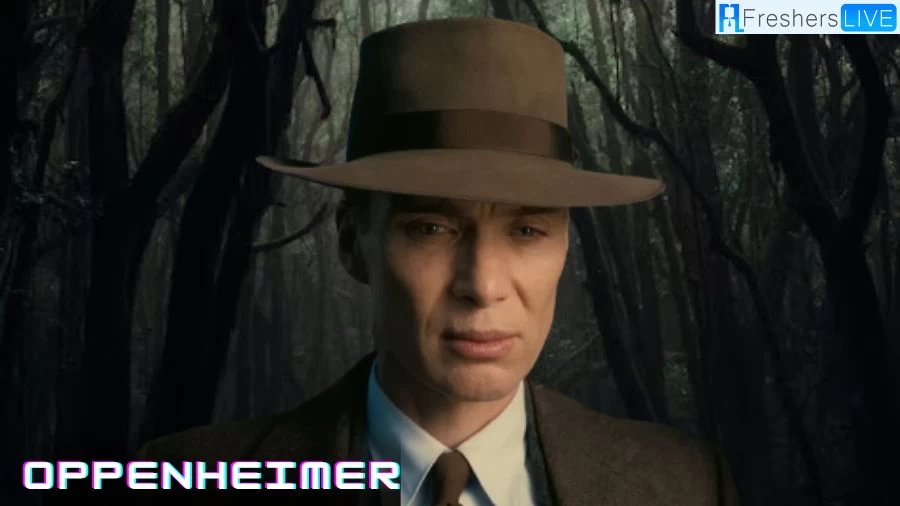Does Oppenheimer Have a Post Credit Scene? Explore More About Oppenheimer!
by Swetha P
Updated Aug 09, 2023

Oppenheimer
"Oppenheimer," an expansive biographical thriller that premiered in 2023, stands as a cinematic marvel under the skilled direction of renowned filmmaker Christopher Nolan. Drawing inspiration from the Pulitzer Prize-honored biography "American Prometheus" penned by Kai Bird and Martin J. Sherwin, the movie is a profound exploration of the life and indelible contributions of J. Robert Oppenheimer, a distinguished American theoretical physicist.
Anchored at its heart, the film's narrative intricately weaves through Oppenheimer's formative years in academia, his instrumental role in orchestrating the Manhattan Project during the tumultuous era of World War II, and the subsequent unraveling of his stature following a pivotal security hearing in 1954. The central character of J. Robert Oppenheimer is compellingly portrayed by Cillian Murphy, who captures the essence of the brilliant scientist with finesse.
The ensemble cast includes Emily Blunt, portraying his wife Katherine "Kitty" Oppenheimer, while Matt Damon takes on the role of General Leslie Groves, the authoritative head of the Manhattan Project. Adding to this formidable lineup, Robert Downey Jr. embodies Lewis Strauss, a significant figure within the U.S.
Atomic Energy Commission and Florence Pugh embody Jean Tatlock, a psychiatrist who shares a complex connection with Oppenheimer. The film is further enriched by the presence of celebrated actors such as Josh Hartnett, Casey Affleck, Rami Malek, and Kenneth Branagh, who collectively contribute to the film's cinematic excellence.
Does Oppenheimer Have a Post-Credit Scene?
In a departure from the prevalent practice in contemporary blockbuster cinema, "Oppenheimer" deliberately abstains from incorporating a post-credits scene. This artistic choice is emblematic of Christopher Nolan's signature approach to filmmaking, one that is marked by his unwavering commitment to crafting self-contained and emotionally resonant narratives.
Renowned for his distinctive style, Nolan remains steadfast in his philosophy of allowing his films to culminate with their intended impact, without resorting to the temptation of post-credits additions. By eschewing this trend, "Oppenheimer" stands as a testament to Nolan's creative integrity, presenting a cinematic experience that hinges on compelling storytelling and the profound emotions it evokes throughout its runtime.
The absence of a post-credits scene in "Oppenheimer" aligns with Nolan's enduring cinematic ethos, reflecting his belief that the conclusion of a film should be a culmination of the narrative's themes, character arcs, and emotional arcs. This choice further underscores the director's respect for the audience's intellect, inviting them to contemplate and absorb the layers of meaning embedded within the movie's final moments.
As the concluding scenes, last lines, and evocative closing shots unfold, they weave a powerful tapestry of reflection and contemplation, ensuring that the narrative's resonance lingers well beyond the theater. In this way, "Oppenheimer" stands as a testament to Nolan's storytelling mastery, embracing the power of a carefully structured conclusion without the need for extraneous post-credits material.
Nolan's Approach to Filmmaking
Christopher Nolan's distinctive approach to filmmaking, underscored by his deliberate exclusion of post-credits scenes, reverberates as a testament to his unwavering commitment to storytelling integrity. This ethos is profoundly evident across the tapestry of his illustrious career, with hallmark examples found in his celebrated Dark Knight trilogy.
In a cinematic landscape where post-credits scenes have become a norm, Nolan stands out by prioritizing the narrative's cohesion, allowing his films to conclude with an impact that is holistic and organic. This dedication to crafting self-contained narratives, untouched by the allure of post-credits embellishments, reflects his profound respect for the audience's engagement and comprehension.
Nolan's principles extend beyond his own works, as his influence has transcended his filmography. Notably, his interactions with Zack Snyder during the production of "Man of Steel" offer a glimpse into his resolute stance. Amid debates about adding a post-credits scene to Snyder's film, Nolan's emphasis on maintaining the film's intrinsic tone prevailed, reinforcing the notion that each film's emotional resonance is most potent when preserved without the temptation of additional scenes.
Legacy of Christopher Nolan's Approach:
"Oppenheimer" serves as a steadfast continuation of Christopher Nolan's revered cinematic legacy, characterized by his unique approach to storytelling. In a cinematic climate where post-credits scenes have become an anticipated element for franchise expansion or tantalizing hints, Nolan's films have steadfastly thrived on the power of their self-contained narratives and profound emotional depth.
This established legacy resonates strongly in "Oppenheimer," where the absence of a post-credits scene underscores Nolan's unwavering dedication to crafting immersive and intellectually stimulating cinematic encounters that stand on their own, offering audiences a complete and enriching experience devoid of extraneous embellishments.
The Ensemble Cast of "Oppenheimer":
"Oppenheimer" boasts a remarkable ensemble cast that breathes life into the complex characters populating its narrative landscape. From Cillian Murphy's portrayal of the enigmatic J. Robert Oppenheimer to Emily Blunt's depiction of his wife Katherine "Kitty" Oppenheimer, the film's cast delivers performances that evoke emotional depth and authenticity.
Matt Damon's embodiment of General Leslie Groves, Robert Downey Jr.'s portrayal of Lewis Strauss, and Florence Pugh's depiction of Jean Tatlock contribute to the film's captivating exploration of historical figures. This section delves into the synergy between the actors, their commitment to their roles, and the seamless camaraderie that elevates "Oppenheimer" into a cinematic experience brimming with vitality and resonance.
Does Oppenheimer Have a Post-Credit Scene? - FAQs
No, the film does not include a post-credits scene.
"Oppenheimer" chronicles the life of physicist J. Robert Oppenheimer and his role in the Manhattan Project during World War II.
The film features a star-studded cast including Cillian Murphy, Emily Blunt, Matt Damon, Robert Downey Jr., and more.
Christopher Nolan prefers to conclude his films without post-credits scenes to maintain the integrity of each story's tone.
Nolan's legacy lies in his ability to create self-contained, impactful narratives that don't rely on post-credits scenes to engage the audience.







